Power System Study Services – Ensuring Reliability and Efficiency in Electrical Networks
For Quick response for Power System Study in India call us at 9013890526 or Whatsapp by Clicking here.
Elion Technologies and Consulting Pvt Ltd specializes in delivering advanced Power System Study Services, designed to ensure the reliability, safety, and efficiency of your electrical systems. Our experienced team uses cutting-edge software like ETAP to provide precise analysis and actionable recommendations.
We presents a comprehensive analysis of power systems conducted by Elion, focusing on various aspects such as system stability, efficiency, and reliability. The study aims to provide insights into the current state of power systems, identify potential areas for improvement, and suggest strategies for enhancing performance and sustainability.
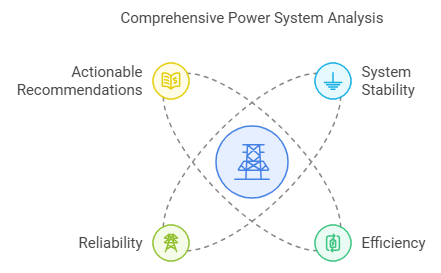
Introduction & Objective of Power System Study
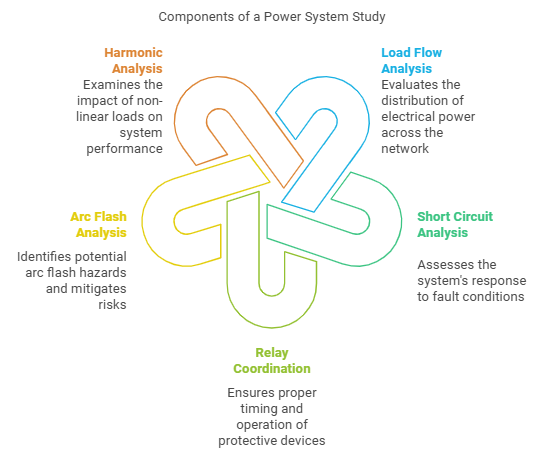
Power systems are critical infrastructures that facilitate the generation, transmission, and distribution of electricity. As the demand for energy continues to rise, there is an increasing need to optimize these systems to ensure they can meet future challenges. This study by Elion explores the intricacies of power systems, examining their components, operational dynamics, and the impact of emerging technologies.
A Power System Study is an in-depth engineering analysis of an electrical power network aimed at evaluating its performance, reliability, safety, and compliance with design and operational standards. It encompasses various assessments such as load flow, short circuit, relay coordination, arc flash, and harmonic analysis to optimize the system’s functionality and safeguard equipment and personnel.
Scope of Power System Study
The study employs a combination of quantitative and qualitative research methods. Data was collected from various power plants, transmission networks, and distribution systems. Advanced simulation tools were utilized to model different scenarios and assess system performance under varying conditions.
Data Collection and Network Modeling
Gathering all necessary data from the client’s site.
Mapping the entire electrical network, from the grid to 0.415kV MCCs, in advanced software like ETAP.
Developing network models to evaluate performance and potential areas of improvement.
Load Flow Analysis
Conducting load flow studies for steady-state and contingency conditions.
Identifying issues like voltage drops, overloading, and system inefficiencies.
Recommending remedial actions for optimized performance and redundancy.
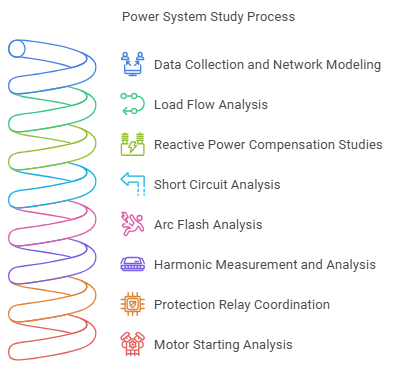
Reactive Power Compensation Studies
Evaluating reactive power flow under different load conditions (base and peak).
Designing capacitor placement strategies to achieve desired power factors.
Recommending static or dynamic compensation to enhance voltage stability.
Short Circuit Analysis
Calculating fault currents for 3-phase and single-line-to-ground faults as per IEC 60909-2001.
Verifying the adequacy of switchgear capabilities.
Proposing solutions for mitigating high fault levels to ensure system safety.
Arc Flash Analysis
Determining arc flash energy levels and protection boundaries.
Providing detailed recommendations for PPE and labeling arc flash hazard categories.
Delivering compliant safety markings and certifications.
Harmonic Measurement and Analysis
Identifying and mitigating harmonic distortions per IEEE 519 standards.
Conducting frequency scanning and assessing Total Harmonic Distortion (THD).
Recommending filters to maintain power quality and prevent resonance issues.
Protection Relay Coordination
Developing protection settings to ensure selectivity, sensitivity, and system stability.
Coordinating relays for transformers, feeders, and motors based on IEEE standards.
Verifying unit protections and proposing additional safety measures as required.
Motor Starting Analysis
Evaluating the starting performance of motors under worst-case scenarios.
Analyzing voltage dips, torque, and speed during motor startup.
Recommending starting devices or techniques to minimize disruptions.
Deliverables of Power System Study
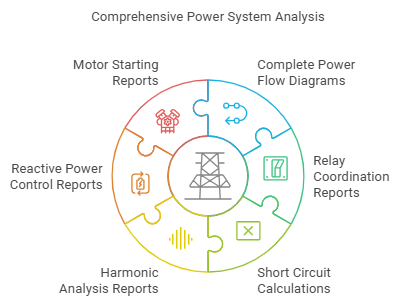
Complete Power Flow Diagrams: Highlighting issues like overloading and voltage violations.
Relay Coordination Reports: Ensuring smooth operation with grid power.
Short Circuit Calculations: Fault current levels at key system points.
Harmonic Analysis Reports: Detailed evaluation of harmonic impacts and filter recommendations.
Reactive Power Control Reports: Recommendations for achieving optimal power factors.
Motor Starting Reports: In-depth analysis of motor performance during startup.
Bill of Quantities (BOQ) and Tender Documentation: For all recommended equipment.
Key Findings of Power System Study
- System Stability: The analysis revealed that many existing power systems face stability challenges due to the integration of renewable energy sources. The fluctuating nature of these sources necessitates improved control mechanisms to maintain grid stability.
Efficiency Improvements: The study identified several opportunities for enhancing the efficiency of power generation and distribution. Upgrading aging infrastructure and implementing smart grid technologies can significantly reduce energy losses.
Reliability Concerns: Reliability remains a critical issue, with many systems experiencing outages and disruptions. The research highlights the importance of predictive maintenance and real-time monitoring to mitigate these risks.
Impact of Renewable Energy: The transition to renewable energy sources is reshaping power systems. While this shift presents challenges, it also offers opportunities for innovation and sustainability.
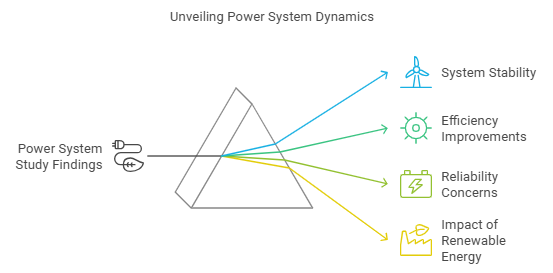
Stay Compliant and Minimize Risks – Start Your Power System Assessment!
FAQs
A Power System Study is a detailed engineering analysis conducted to evaluate and optimize the performance, safety, reliability, and efficiency of an electrical network under various operating and fault conditions.
It ensures safe and reliable operation, minimizes risks like equipment failures and arc flash hazards, optimizes energy use, and ensures compliance with standards like IEC, IEEE, and local regulations.
The study includes:
- Load Flow Analysis
- Short Circuit Study
- Arc Flash Analysis
- Harmonic Analysis
- Protection Relay Coordination
- Motor Starting Analysis
- Reactive Power Compensation
Industries like manufacturing, oil and gas, power generation, data centers, healthcare facilities, and commercial complexes benefit from power system studies to maintain system efficiency and safety.
Tools like ETAP, SKM PowerTools, and DIgSILENT PowerFactory are commonly used for accurate simulations and analyses of electrical networks.
It is recommended to perform a study:
- During the commissioning of new electrical systems.
- After significant network modifications or expansions.
- Periodically, as part of preventive maintenance.
The study adheres to standards such as:
- IEC 60909 for short circuit calculations
- IEEE 519 for harmonic distortion limits
- NFPA 70E for arc flash hazard analysis
Load Flow Analysis evaluates the steady-state performance of an electrical system, identifying issues like voltage drops, overloading, and inefficient power distribution.
This study calculates fault currents in the system to ensure that equipment like circuit breakers can handle fault conditions without failing.
Arc Flash Analysis determines the energy released during an arc flash event and provides recommendations for personal protective equipment (PPE) and safety protocols to protect personnel.
Harmonic Analysis identifies distortions caused by nonlinear loads and recommends solutions like filters to improve power quality and reduce equipment stress.
Relay Coordination ensures that protective relays operate in the correct sequence during faults to isolate the affected section without disrupting the entire system.
It evaluates the impact of large motor startups on the system, addressing voltage dips and recommending solutions like soft starters or reactors to minimize disruptions.
It improves the system’s power factor, reduces energy losses, and enhances voltage stability by optimizing reactive power flows using capacitor banks or static compensators.
By aligning with international and local standards, these studies ensure that your system meets legal and safety requirements, reducing the risk of fines or penalties.
Deliverables include:
- Power flow diagrams
- Short circuit analysis reports
- Relay coordination settings
- Harmonic analysis reports
- Recommendations for system improvement
The duration depends on the system’s complexity but typically ranges from 8 to 15 weeks, including data collection, analysis, and reporting.
- Voltage instability
- Overloading and equipment failures
- Harmonic distortions
- Protection device malfunctions
- Arc flash hazards
Yes, these studies provide data-driven insights to accommodate load growth and integrate renewable energy or advanced technologies into your network.
Contact a trusted consultancy like Elion Technologies. Share your system details, and our experts will guide you through the process, ensuring customized solutions for your unique requirements.

